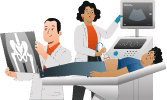near you Trusted by +
Patients Across India

Ct Scan (5)
Starting from₹36845
Starting from₹6089
Starting from₹10043
Starting from₹9900
Starting from₹12782
FAQs
What is a CT scan?
A CT scan (Computed Tomography) test is an advanced imaging technique that uses X-rays and computer technology to generate detailed, cross-sectional images of the body. It offers more comprehensive information than a regular X-ray, enabling doctors to effectively diagnose and treat various medical conditions. You can book a CT scan test to assess issues like organ abnormalities, tumors, fractures, and more.
How long does a CT scan take?
A CT scan test typically takes less than 30 minutes. The actual scanning process is quick, usually lasting only a few seconds to a few minutes. However, the total time includes positioning the patient on the scanner table and processing the captured images. The procedure is swift, and you can book a CT scan test for a convenient time to minimise waiting.
What can I expect during a CT scan?
During a CT scan test, you will lie flat on a table that slides through the centre of the scanner. The scanner rotates around your body, emitting a narrow X-ray beam to capture detailed images. You may be asked to hold your breath briefly and remain still for clear image quality. It's a quick and painless process, so book CT scan test to assess various health conditions efficiently.
What does a CT scan report look like?
A CT scan test report includes the radiologist's interpretation of the images, highlighting any abnormalities, their location, and recommendations for further tests or treatment. The report is typically accompanied by a film of the scan, and your doctor will discuss the findings in detail with you. For easy access, many centres offer the option to view your CT scan test report online.
How can I book a CT scan online on Apollo 24|7?
To book a CT scan test online on Apollo 24|7, visit their website, choose the CT scan test, fill in your personal details, select a convenient time, and choose your preferred location. After making the payment, you'll receive a confirmation message with your appointment details. This online option makes it easier to schedule and manage your CT scan test.
Is a CT scan safe?
CT scans are generally safe, though there are some risks, including radiation exposure (especially with repeated scans, which may increase cancer risk), allergic reactions to contrast materials (though rare), and temporary side effects from the contrast (like nausea or headache). However, the benefits of a CT scan test usually outweigh these risks. If you're concerned, you can check the CT scan test price and consult your doctor for further clarification.
How much is a full body CT scan price near me?
The CT scan test cost varies depending on the type of scan and the facility. It's best to check with your nearest diagnostic centre for the CT scan test price near me. You can also compare prices at different labs and clinics to find affordable options for a full-body CT scan or search online by typing ‘best CT scan test cost near me’.
Is a CT scan painful?
No, a CT scan test is non-invasive and painless. While you may feel some discomfort from holding still or briefly holding your breath during the scan, the process itself is not painful. The scanner does not touch your body, and you will not feel the X-rays. It’s a quick procedure, and you can book a CT scan test for your convenience.
When will I get my CT scan reports?
The time it takes to receive your CT scan test reports depends on the complexity of your case and the facility. Generally, reports are available within 24 to 48 hours after the test. Some centres may provide them on the same day, while others may take a few days. Always check with the centre to know the expected turnaround time for your CT scan test reports.
How should I prepare for a CT scan?
Preparation for a CT scan test varies depending on the type of scan. Your doctor will give you specific instructions. Typically, you may be asked to fast for a few hours before the procedure, wear loose and comfortable clothing, and remove any metal objects. If a contrast material is required, you’ll receive guidelines for its administration. For accurate results, it's crucial to follow the given preparation steps when you book a CT scan test.

